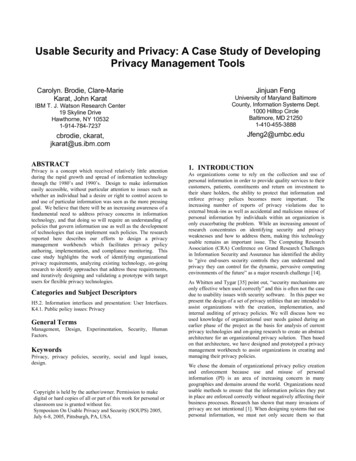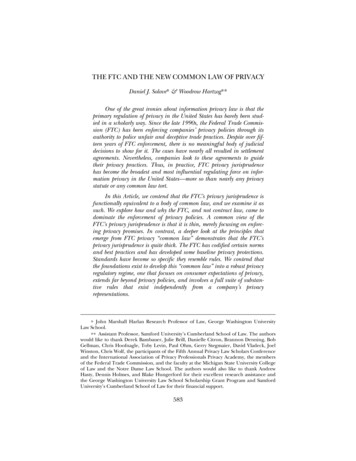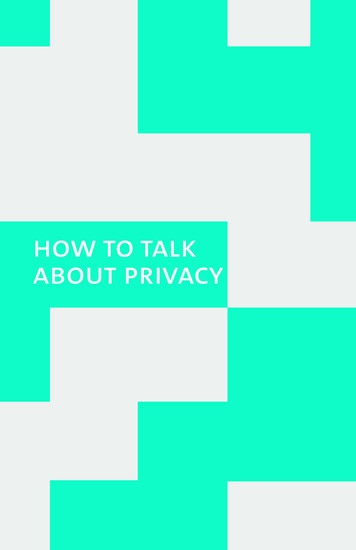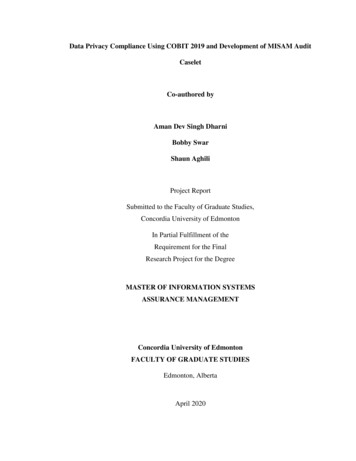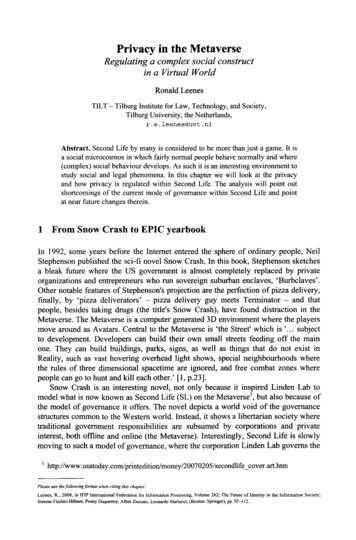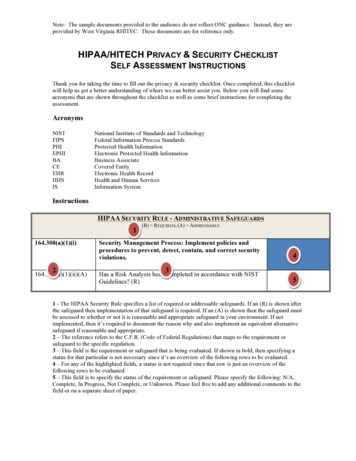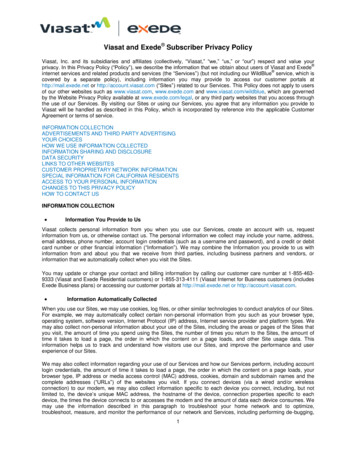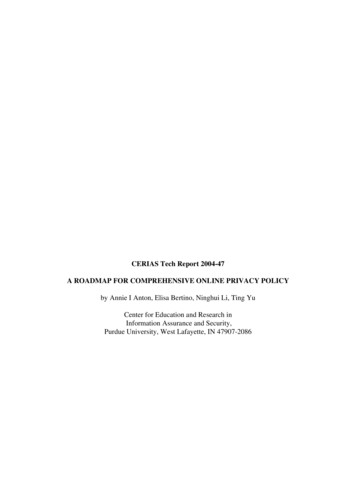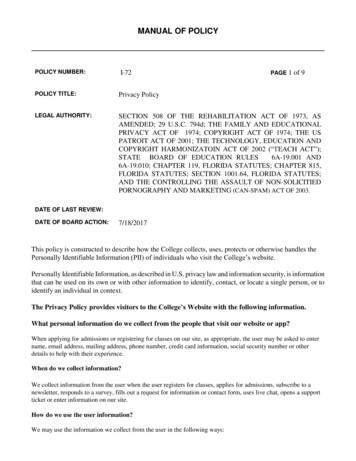
Transcription
MANUAL OF POLICYPOLICY NUMBER:I-72PAGE 1of 9POLICY TITLE:Privacy PolicyLEGAL AUTHORITY:SECTION 508 OF THE REHABILITATION ACT OF 1973, ASAMENDED; 29 U.S.C. 794d; THE FAMILY AND EDUCATIONALPRIVACY ACT OF 1974; COPYRIGHT ACT OF 1974; THE USPATROIT ACT OF 2001; THE TECHNOLOGY, EDUCATION ANDCOPYRIGHT HARMONIZATOIN ACT OF 2002 (“TEACH ACT”);STATE BOARD OF EDUCATION RULES6A-19.001 AND6A-19.010; CHAPTER 119, FLORIDA STATUTES; CHAPTER 815,FLORIDA STATUTES; SECTION 1001.64, FLORIDA STATUTES;AND THE CONTROLLING THE ASSAULT OF NON-SOLICITIEDPORNOGRAPHY AND MARKETING (CAN-SPAM) ACT OF 2003.DATE OF LAST REVIEW:DATE OF BOARD ACTION:7/18/2017This policy is constructed to describe how the College collects, uses, protects or otherwise handles thePersonally Identifiable Information (PII) of individuals who visit the College’s website.Personally Identifiable Information, as described in U.S. privacy law and information security, is informationthat can be used on its own or with other information to identify, contact, or locate a single person, or toidentify an individual in context.The Privacy Policy provides visitors to the College’s Website with the following information.What personal information do we collect from the people that visit our website or app?When applying for admissions or registering for classes on our site, as appropriate, the user may be asked to entername, email address, mailing address, phone number, credit card information, social security number or otherdetails to help with their experience.When do we collect information?We collect information from the user when the user registers for classes, applies for admissions, subscribe to anewsletter, responds to a survey, fills out a request for information or contact form, uses live chat, opens a supportticket or enter information on our site.How do we use the user information?We may use the information we collect from the user in the following ways:
MANUAL OF POLICYPOLICY NUMBER:I-72PAGE 2of 9POLICY TITLE:Privacy PolicyLEGAL AUTHORITY:SECTION 508 OF THE REHABILITATION ACT OF 1973, ASAMENDED; 29 U.S.C. 794d; THE FAMILY AND EDUCATIONALPRIVACY ACT OF 1974; COPYRIGHT ACT OF 1974; THE USPATROIT ACT OF 2001; THE TECHNOLOGY, EDUCATION ANDCOPYRIGHT HARMONIZATOIN ACT OF 2002 (“TEACH ACT”);STATE BOARD OF EDUCATION RULES6A-19.001 AND6A-19.010; CHAPTER 119, FLORIDA STATUTES; CHAPTER 815,FLORIDA STATUTES; SECTION 1001.64, FLORIDA STATUTES;AND THE CONTROLLING THE ASSAULT OF NON-SOLICITIEDPORNOGRAPHY AND MARKETING (CAN-SPAM) ACT OF 2003.DATE OF LAST REVIEW:DATE OF BOARD ACTION: 7/18/2017To personalize their experience and to allow us to deliver the type of content and product offerings inwhich the user is most interested.To improve our website in order to better serve the user.To allow us to better serve the user in responding to customer service requests.To quickly process the user transactions.To send periodic emails regarding the user’s classes or other services.To follow up with the user after correspondence (live chat, email or phone inquiries).How do we protect the user’s information?The user’s personal information is contained behind secured networks and is only accessible by a limitednumber of persons who have special access rights to such systems, and are required to keep the informationconfidential. In addition, all sensitive/credit information the user supplies encrypted via Secure Socket Layer(SSL) technology.We implement a variety of security measures when a user conducts a transaction, submits, or accesses theirinformation to maintain the safety of the user personal information.All transactions are processed through a gateway provider and are not stored or processed on our servers.Do we use 'cookies'?Yes. Cookies are small files that a site or its service provider transfers the user ‘s computer's hard drive throughtheir Web browser (if the user allows) that enables the site's or service provider's systems to recognize the user’sbrowser and capture and remember certain information. They are used to help us understand the user’s
MANUAL OF POLICYPOLICY NUMBER:I-72PAGE 3of 9POLICY TITLE:Privacy PolicyLEGAL AUTHORITY:SECTION 508 OF THE REHABILITATION ACT OF 1973, ASAMENDED; 29 U.S.C. 794d; THE FAMILY AND EDUCATIONALPRIVACY ACT OF 1974; COPYRIGHT ACT OF 1974; THE USPATROIT ACT OF 2001; THE TECHNOLOGY, EDUCATION ANDCOPYRIGHT HARMONIZATOIN ACT OF 2002 (“TEACH ACT”);STATE BOARD OF EDUCATION RULES6A-19.001 AND6A-19.010; CHAPTER 119, FLORIDA STATUTES; CHAPTER 815,FLORIDA STATUTES; SECTION 1001.64, FLORIDA STATUTES;AND THE CONTROLLING THE ASSAULT OF NON-SOLICITIEDPORNOGRAPHY AND MARKETING (CAN-SPAM) ACT OF 2003.DATE OF LAST REVIEW:DATE OF BOARD ACTION:7/18/2017preferences based on previous or current site activity, which enables us to provide the user with improvedservices. We also use cookies to help us compile aggregate data about site traffic and site interaction so that wecan offer better site experiences and tools in the future. We use cookies to: Understand and save user's preferences for future visits.Keep track of advertisements.Compile aggregate data about site traffic and site interactions in order to offer better site experiencesand tools in the future. We may also use trusted third party services that track this information on ourbehalf.Serve ads on third-party sites based on previous visits to our site.Users may choose to have their computer warn them each time a cookie is being sent, or the user may choose toturn off all cookies. The user does this through their browser settings. Since all browsers are a little different, theuser should explore their browser's help menu to learn the correct way to modify cookie settings.If the user turns cookies off, some features will be disabled. Some of these features make the user site experiencemore efficient and may affect the functionality of the site.Third-party disclosureWe do not sell, trade, or otherwise transfer to outside parties a user’s personally identifiable information unless weprovide the user with advance notice. This does not include website hosting partners and other parties who assist usin operating our website, conducting our business, or servicing the user, so long as those parties agree to keep thisinformation confidential. We may also release the user’s information when we believe release is appropriate tocomply with the law, enforce our site policies, or protect ours or others' rights, property, or safety.
MANUAL OF POLICYPOLICY NUMBER:I-72PAGE 4of 9POLICY TITLE:Privacy PolicyLEGAL AUTHORITY:SECTION 508 OF THE REHABILITATION ACT OF 1973, ASAMENDED; 29 U.S.C. 794d; THE FAMILY AND EDUCATIONALPRIVACY ACT OF 1974; COPYRIGHT ACT OF 1974; THE USPATROIT ACT OF 2001; THE TECHNOLOGY, EDUCATION ANDCOPYRIGHT HARMONIZATOIN ACT OF 2002 (“TEACH ACT”);STATE BOARD OF EDUCATION RULES6A-19.001 AND6A-19.010; CHAPTER 119, FLORIDA STATUTES; CHAPTER 815,FLORIDA STATUTES; SECTION 1001.64, FLORIDA STATUTES;AND THE CONTROLLING THE ASSAULT OF NON-SOLICITIEDPORNOGRAPHY AND MARKETING (CAN-SPAM) ACT OF 2003.DATE OF LAST REVIEW:DATE OF BOARD ACTION:7/18/2017However, non-personally identifiable visitor information may be provided to other parties for marketing,advertising, or other uses.Third-party linksOccasionally, at our discretion, we may include or offer third-party products or services on our website.These third-party sites have separate and independent privacy policies. We therefore have no responsibilityor liability for the content and activities of these linked sites. Nonetheless, we seek to protect the integrity ofour site and welcome any feedback about these sites.GoogleGoogle's advertising requirements can be summed up by Google's Advertising Principles. They are put inplace to provide a positive experience for users. We use Google AdSense Advertising on our website.Google, as a third-party vendor, uses cookies to serve ads on our site. Google's use of the DART cookieenables it to serve ads to our users based on previous visits to our site and other sites on the Internet. Usersmay opt-out of the use of the DART cookie by visiting the Google Ad and Content Network privacy policy.We have implemented the following: Remarketing with Google AdSenseGoogle Display Network Impression ReportingDemographics and Interests Reporting
MANUAL OF POLICYPOLICY NUMBER:I-72PAGE 5of 9POLICY TITLE:Privacy PolicyLEGAL AUTHORITY:SECTION 508 OF THE REHABILITATION ACT OF 1973, ASAMENDED; 29 U.S.C. 794d; THE FAMILY AND EDUCATIONALPRIVACY ACT OF 1974; COPYRIGHT ACT OF 1974; THE USPATROIT ACT OF 2001; THE TECHNOLOGY, EDUCATION ANDCOPYRIGHT HARMONIZATOIN ACT OF 2002 (“TEACH ACT”);STATE BOARD OF EDUCATION RULES6A-19.001 AND6A-19.010; CHAPTER 119, FLORIDA STATUTES; CHAPTER 815,FLORIDA STATUTES; SECTION 1001.64, FLORIDA STATUTES;AND THE CONTROLLING THE ASSAULT OF NON-SOLICITIEDPORNOGRAPHY AND MARKETING (CAN-SPAM) ACT OF 2003.DATE OF LAST REVIEW:DATE OF BOARD ACTION:7/18/2017We, along with third-party vendors such as Google use first-party cookies (such as the Google Analyticscookies) and third-party cookies (such as the DoubleClick cookie) or other third-party identifiers together tocompile data regarding user interactions with ad impressions and other ad service functions as they relate toour website.Opting outUsers may set preferences for how Google advertises to the individual using the Google Ad Settings page.Alternatively, the user may opt out by visiting the Network Advertising Initiative Opt Out page or by using theGoogle Analytics Opt Out Browser add-on.California Online Privacy Protection ActCalOPPA is the first state law in the nation to require commercial websites and online services to post aprivacy policy. The law's reach stretches well beyond California to require any person or company in theUnited States (and conceivably the world) that operates websites collecting Personally IdentifiableInformation from California consumers to post a conspicuous privacy policy on its website stating exactlythe information being collected and those individuals or companies with whom it is being shared. - See moreat: ng to CalOPPA, we agree to the following: Users may visit our site anonymously.
MANUAL OF POLICYPOLICY NUMBER:I-72PAGE 6of 9POLICY TITLE:Privacy PolicyLEGAL AUTHORITY:SECTION 508 OF THE REHABILITATION ACT OF 1973, ASAMENDED; 29 U.S.C. 794d; THE FAMILY AND EDUCATIONALPRIVACY ACT OF 1974; COPYRIGHT ACT OF 1974; THE USPATROIT ACT OF 2001; THE TECHNOLOGY, EDUCATION ANDCOPYRIGHT HARMONIZATOIN ACT OF 2002 (“TEACH ACT”);STATE BOARD OF EDUCATION RULES6A-19.001 AND6A-19.010; CHAPTER 119, FLORIDA STATUTES; CHAPTER 815,FLORIDA STATUTES; SECTION 1001.64, FLORIDA STATUTES;AND THE CONTROLLING THE ASSAULT OF NON-SOLICITIEDPORNOGRAPHY AND MARKETING (CAN-SPAM) ACT OF 2003.DATE OF LAST REVIEW:DATE OF BOARD ACTION: 7/18/2017At the time this privacy policy goes into effect, we will add a link to it in our footer.Our Privacy Policy link includes the word 'Privacy' and can be easily be found in our web pagefooter.Users will be notified of any Privacy Policy changes: On our Privacy Policy Page Via email to their MDC accountUsers are able to change their personal information: By emailing usBy calling usBy logging in to their accountThird-party Behavioral Tracking?It's also important to note that we allow third-party behavioral tracking. Behavioral Tracking is an onlinetechnique of collecting and interpreting market research data from browsing sessions with the intent ofcustomizing Internet advertising to specific visitors. Marketing and advertising agencies use behavioraltracking to follow the activities of users as they surf the World Wide Web.COPPA (Children Online Privacy Protection Act)
MANUAL OF POLICYPOLICY NUMBER:I-72PAGE 7of 9POLICY TITLE:Privacy PolicyLEGAL AUTHORITY:SECTION 508 OF THE REHABILITATION ACT OF 1973, ASAMENDED; 29 U.S.C. 794d; THE FAMILY AND EDUCATIONALPRIVACY ACT OF 1974; COPYRIGHT ACT OF 1974; THE USPATROIT ACT OF 2001; THE TECHNOLOGY, EDUCATION ANDCOPYRIGHT HARMONIZATOIN ACT OF 2002 (“TEACH ACT”);STATE BOARD OF EDUCATION RULES6A-19.001 AND6A-19.010; CHAPTER 119, FLORIDA STATUTES; CHAPTER 815,FLORIDA STATUTES; SECTION 1001.64, FLORIDA STATUTES;AND THE CONTROLLING THE ASSAULT OF NON-SOLICITIEDPORNOGRAPHY AND MARKETING (CAN-SPAM) ACT OF 2003.DATE OF LAST REVIEW:DATE OF BOARD ACTION:7/18/2017When it comes to the collection of personal information from children under the age of 13 years old, theChildren's Online Privacy Protection Act (COPPA) puts parents in control. The Federal Trade Commission,United States' consumer protection agency, enforces the COPPA Rule, which spells out what operators ofwebsites and online services must do to protect children's privacy and safety online.We do not specifically market to children under the age of 13 years old.Fair Information PracticesThe United States Federal Trade Commission's Fair Information Practices form the backbone of privacy law in theUnited States and the concepts they include have played a significant role in the development of data protectionlaws around the globe. Understanding the Fair Information Practice Principles and how they should beimplemented is critical to comply with the various privacy laws that protect personal information.In order to be in line with Fair Information Practices, should a data breach occur, we will take thefollowing responsive action:We will notify users by email within 7 business days.We also agree to the Individual Redress Principle which requires that individuals have the right to legallypursue enforceable rights against data collectors and processors who fail to adhere to the law. This principlerequires not only that individuals have enforceable rights against data users, but also that individuals haverecourse to courts or government agencies to investigate and/or prosecute non-compliance by dataprocessors.
MANUAL OF POLICYPOLICY NUMBER:I-72PAGE 8of 9POLICY TITLE:Privacy PolicyLEGAL AUTHORITY:SECTION 508 OF THE REHABILITATION ACT OF 1973, ASAMENDED; 29 U.S.C. 794d; THE FAMILY AND EDUCATIONALPRIVACY ACT OF 1974; COPYRIGHT ACT OF 1974; THE USPATROIT ACT OF 2001; THE TECHNOLOGY, EDUCATION ANDCOPYRIGHT HARMONIZATOIN ACT OF 2002 (“TEACH ACT”);STATE BOARD OF EDUCATION RULES6A-19.001 AND6A-19.010; CHAPTER 119, FLORIDA STATUTES; CHAPTER 815,FLORIDA STATUTES; SECTION 1001.64, FLORIDA STATUTES;AND THE CONTROLLING THE ASSAULT OF NON-SOLICITIEDPORNOGRAPHY AND MARKETING (CAN-SPAM) ACT OF 2003.DATE OF LAST REVIEW:DATE OF BOARD ACTION:7/18/2017CANSPAM ActThe Controlling the Assault of Non-Solicited Pornography And Marketing (CAN-SPAM) Act of 2003 is a law thatsets the rules for commercial email, establishes requirements for commercial messages, gives recipients the right tohave emails stopped from being sent to them, and spells out tough penalties for violations.We collect the user’s email address in order to: Send information, respond to inquiries, and/or other requests or questionsSend the user additional information related to our product and/or serviceMarket to our mailing list or continue to send emails to our clients after the original transaction hasoccurred.To be in accordance with CANSPAM, we agree to the following: Not use false or misleading subjects or email addresses. Identify the message as an advertisement in some reasonable way.Include the physical address of our business or site headquarters.Monitor third-party email marketing services for compliance, if one is used.Honor opt-out/unsubscribe requests quickly.Allow users to unsubscribe by using the link at the bottom of each email.If at any time the user would like to unsubscribe from receiving future emails, the user can follow the
MANUAL OF POLICYPOLICY NUMBER:I-72PAGE 9of 9POLICY TITLE:Privacy PolicyLEGAL AUTHORITY:SECTION 508 OF THE REHABILITATION ACT OF 1973, ASAMENDED; 29 U.S.C. 794d; THE FAMILY AND EDUCATIONALPRIVACY ACT OF 1974; COPYRIGHT ACT OF 1974; THE USPATROIT ACT OF 2001; THE TECHNOLOGY, EDUCATION ANDCOPYRIGHT HARMONIZATOIN ACT OF 2002 (“TEACH ACT”);STATE BOARD OF EDUCATION RULES6A-19.001 AND6A-19.010; CHAPTER 119, FLORIDA STATUTES; CHAPTER 815,FLORIDA STATUTES; SECTION 1001.64, FLORIDA STATUTES;AND THE CONTROLLING THE ASSAULT OF NON-SOLICITIEDPORNOGRAPHY AND MARKETING (CAN-SPAM) ACT OF 2003.DATE OF LAST REVIEW:DATE OF BOARD ACTION:7/18/2017instructions at the bottom of each email and we will promptly remove the user from future correspondences.Contacting The CollegeIf there are any questions regarding this privacy policy, the user may contact us using the information below.Miami Dade College, Wolfson Campus300 Northeast 2nd Avenue, Miami, FL 33176Miami Dade NDATE
6a-19.010; chapter 119, florida statutes ; chapter 815, florida statutes ; section 1001.64, florida statutes ; and the controlling the assault of non-solicitied pornography and marketing (can-spam) act of 2003. date of last review: date of board action: 7/18/2 017
